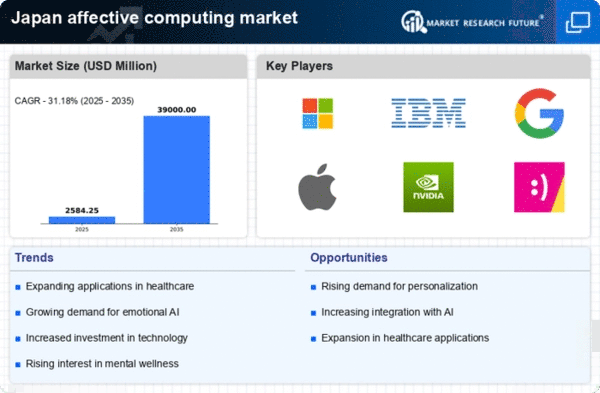Increased Focus on Mental Health
The heightened awareness of mental health issues in Japan has led to a surge in demand for solutions that can assist in emotional well-being. The affective computing market is positioned to address this need by providing tools that can monitor and analyze emotional states. Technologies such as wearable devices and mobile applications are being developed to help individuals track their mental health. The Japanese government has recognized the importance of mental health, allocating ¥30 billion for mental health initiatives in recent budgets. This focus on emotional well-being is likely to drive the adoption of affective computing technologies, as they offer innovative ways to support mental health management.
Technological Advancements in AI
The rapid evolution of artificial intelligence (AI) technologies is a primary driver for the affective computing market in Japan. Innovations in machine learning and natural language processing enable systems to better understand and interpret human emotions. This capability is particularly valuable in sectors such as customer service and mental health, where emotional intelligence can enhance user experience. The Japanese government has invested heavily in AI research, with funding exceeding ¥100 billion in recent years. This investment fosters a conducive environment for startups and established companies to develop affective computing solutions. As AI technologies continue to mature, the demand for emotionally aware systems is likely to grow, propelling the affective computing market forward.
Growth of Smart Home Technologies
The proliferation of smart home technologies in Japan is another significant driver for the affective computing market. As households increasingly adopt smart devices, there is a growing demand for systems that can respond to the emotional states of residents. Affective computing can enhance the functionality of smart home devices, enabling them to adjust settings based on the emotional atmosphere of the home. The smart home market in Japan is projected to reach ¥2 trillion by 2027, indicating a robust opportunity for affective computing applications. This integration not only improves user experience but also promotes emotional well-being, making it a compelling area for market growth.
Rising Demand for Personalized Experiences
In Japan, there is a growing expectation for personalized experiences across various sectors, including retail, entertainment, and healthcare. Consumers increasingly seek products and services that cater to their individual emotional needs. This trend drives the affective computing market, as businesses leverage emotional analytics to tailor their offerings. For instance, companies are utilizing affective computing technologies to analyze customer feedback and emotional responses, leading to improved product design and marketing strategies. The market for personalized services is projected to reach ¥5 trillion by 2026, indicating a substantial opportunity for affective computing solutions that can enhance customer engagement and satisfaction.
Integration of Affective Computing in Education
The education sector in Japan is increasingly adopting affective computing technologies to enhance learning experiences. By integrating emotional recognition systems into educational tools, educators can better understand student engagement and emotional responses. This approach allows for more tailored teaching methods that cater to individual learning styles. The Japanese Ministry of Education has initiated programs to incorporate technology in classrooms, with a budget of ¥50 billion dedicated to educational innovation. As schools and universities embrace these technologies, the affective computing market is expected to expand, providing opportunities for developers to create solutions that foster emotional intelligence in students.
















